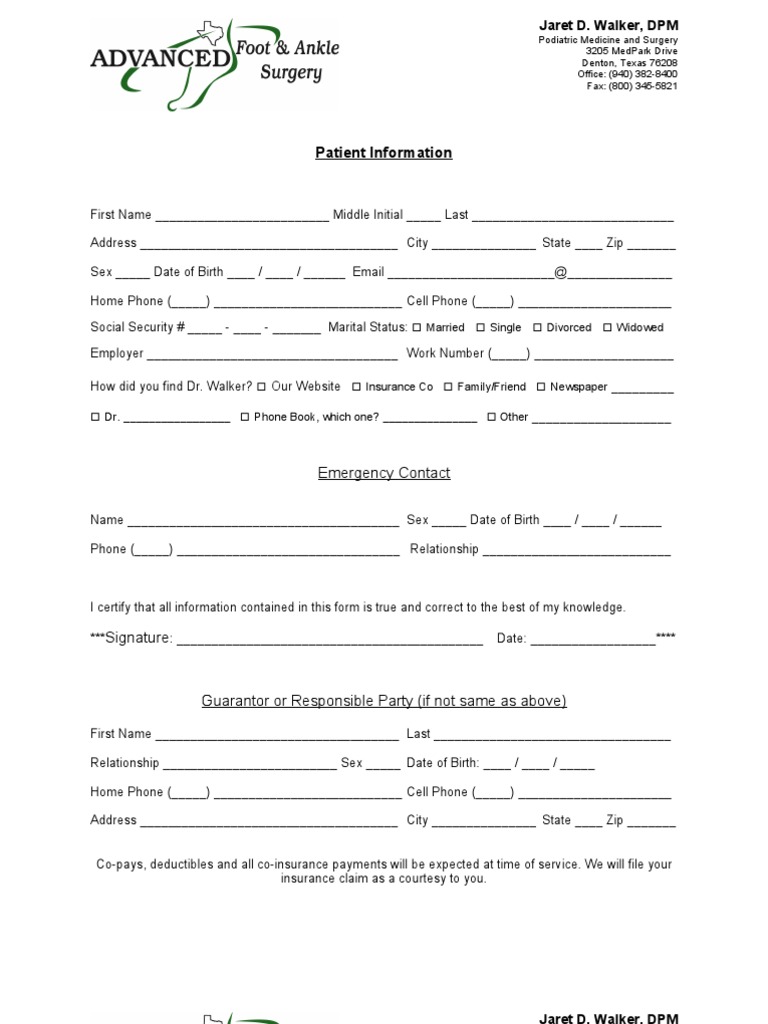7 Essential Items for New Patient Paperwork

Embarking on the journey of managing a new patient intake can seem overwhelming for both healthcare providers and the new patients themselves. Whether you're setting up a new practice or simply updating your existing patient onboarding process, having the right set of paperwork in place is crucial. This comprehensive guide outlines the 7 essential items for new patient paperwork to ensure a smooth, efficient, and compliant process.
The Importance of Efficient Patient Paperwork

Before diving into the specifics, it’s worth acknowledging the significance of well-organized patient paperwork. These documents are not merely about bureaucracy; they:
- Ensure compliance with healthcare regulations.
- Provide essential patient history and medical information.
- Improve care coordination and continuity.
- Facilitate accurate billing and insurance processing.
1. Patient Registration Form

The first piece of paperwork a patient should encounter is the patient registration form. This form captures essential personal and demographic information including:
- Full Name
- Address and Contact Information
- Date of Birth
- Emergency Contact Details
- Insurance Information
📝 Note: Ensure that the form includes spaces for both the primary insurance and any secondary insurance if applicable.
2. Medical History Questionnaire

A comprehensive medical history questionnaire is crucial to understand the patient’s past medical conditions, treatments, allergies, and family medical history. This information helps in:
- Formulating accurate diagnoses
- Planning treatment
- Preventing adverse drug interactions
3. Informed Consent Forms

Patients need to be informed about their treatments and give consent. Informed consent forms should cover:
- Description of the procedure or treatment
- Benefits, risks, and potential complications
- Alternatives to the proposed treatment
- Confirmation that the patient’s questions have been answered
4. HIPAA Privacy Notice

Compliance with the Health Insurance Portability and Accountability Act (HIPAA) is non-negotiable. The HIPAA privacy notice informs patients about:
- How their health information may be used or disclosed
- Their rights with regard to their information
- The practice’s legal duties to protect privacy
5. Financial Responsibility Agreement

With healthcare costs on the rise, clarifying financial responsibilities upfront is essential. This document should include:
- Explanation of insurance coverage
- Description of services not covered by insurance
- Payment policies and options
- Patient’s acknowledgment of financial obligations
6. Release of Information Authorization

Patients might need records from other healthcare providers, and vice versa. This form allows for the exchange of medical information ensuring:
- Appropriate care coordination
- Legal compliance
- Informed decision making
7. Appointment and Cancellation Policy

Effective management of patient schedules is crucial for the smooth operation of a healthcare facility. An appointment and cancellation policy should detail:
- The scheduling process
- Timeframes for cancellation or rescheduling
- Penalties or fees for no-shows or late cancellations
Having these seven essential items in your new patient paperwork ensures a structured and efficient process that benefits both the patient and the practice. By optimizing paperwork, healthcare providers can enhance patient satisfaction, streamline administrative tasks, and reduce potential legal issues.
Why is a patient registration form important?

+
The patient registration form captures vital personal and demographic information, which is essential for record-keeping, insurance processing, and emergency contact.
Can medical history information be shared with third parties?

+
Medical history can only be shared if the patient signs a release of information authorization. Otherwise, sharing such information without consent is a violation of privacy laws like HIPAA.
What happens if a patient does not agree to the financial responsibility agreement?

+
If a patient does not agree to the financial responsibility agreement, they might not be able to receive treatment at the facility, or they might need to discuss alternative payment options.
How should healthcare practices handle appointment cancellations?

+
Healthcare practices should enforce an appointment and cancellation policy that clearly states the timeframes for cancellation or rescheduling and any associated fees or penalties.
Are all practices required to provide a HIPAA privacy notice?

+
Yes, any practice that falls under HIPAA jurisdiction must provide patients with a notice of privacy practices detailing how patient information is used and protected.
Ensuring you have these key documents in place helps in creating a professional, respectful, and compliant atmosphere for patient care. Remember, the ultimate goal is to provide the best patient experience while maintaining operational efficiency and legal compliance.



